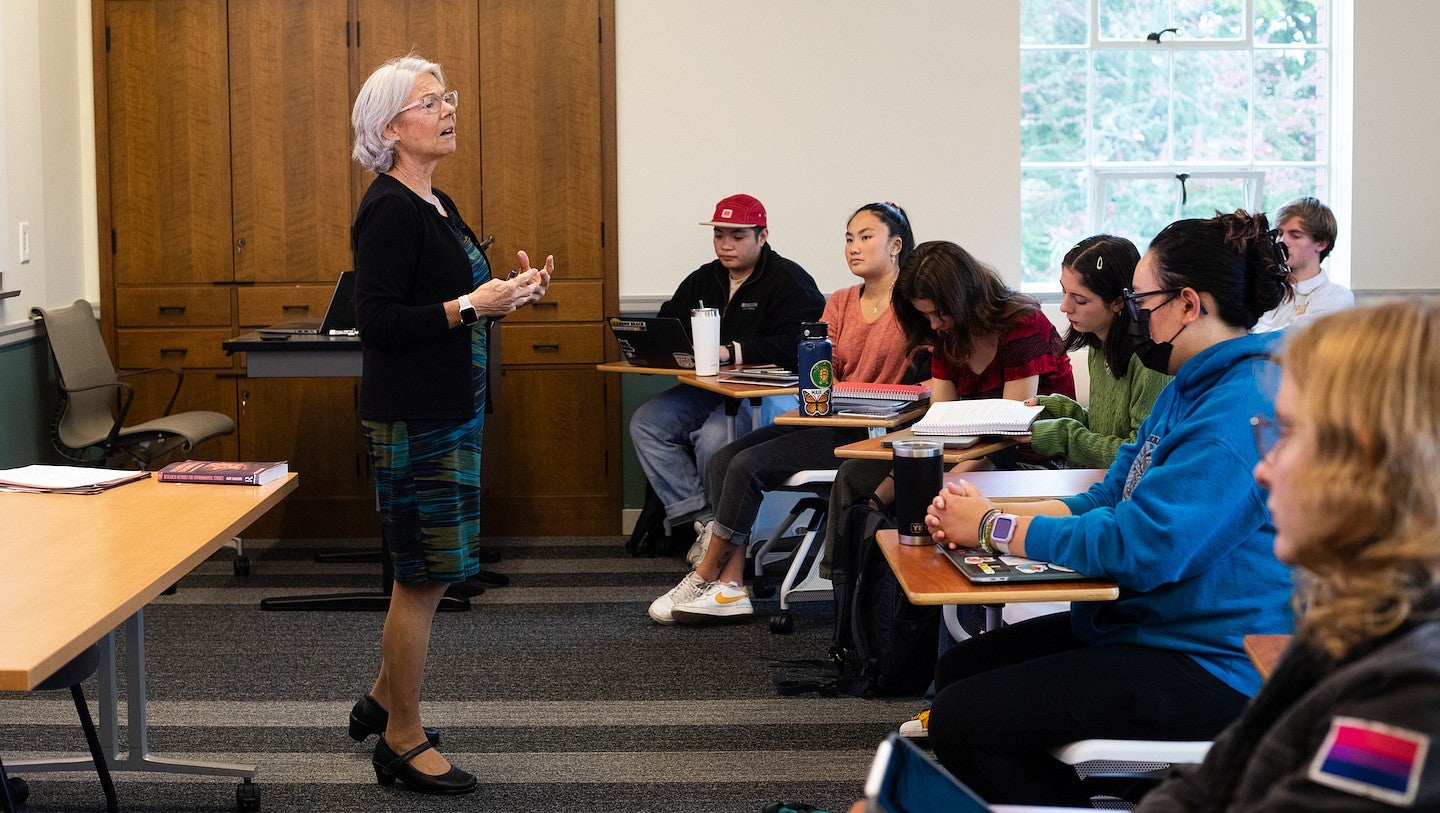
Building community through humility
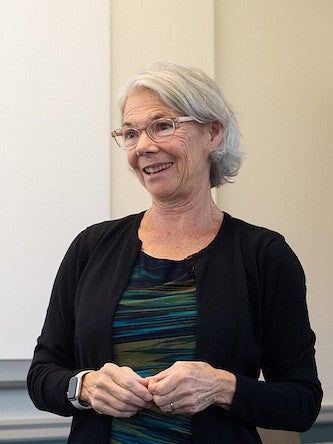
Sweet or salty: Both, together!
Currently bingeing: Abbott Elementary
Quote you live by: “Each time a man stands up for an ideal, or acts to improve the lot of others, or strikes out against injustice, he sends forth a tiny ripple of hope, and crossing each other from a million different centers of energy and daring those ripples build a current which can sweep down the mightiest walls of oppression and resistance.” – RFK
Advice for students: Be curious, persistent and use your talents and privilege to make a difference in the lives of others.
When Ellen Fitzpatrick was in fourth grade, she wanted to solve world hunger. It was the 1960s and countries across the globe were experiencing crises around hunger, a reality different from her own experience attending an all-girls school in Lynchburg, Virginia.
Sparked by her teacher, Fitzpatrick pored over “five little books,” all covering different regions of the world. For her, the reading served as a window to a world she’d never imagined.
Now with more than 25 years of field research and years of teaching at the university level, Fitzpatrick’s goal is to listen to what communities say they need, facilitate solutions, and teach the lasting power of humility.
“Change must start with the community,” Fitzpatrick says. “They’re the authors of it, because I don’t think you can have sustainable change unless the community you’re working with has become empowered.”
As a new addition to the Clark Honors College core faculty, Fitzpatrick plans on empowering students to shape their roles in a changing climate. She started this fall as an instructor focusing on environmental issues and global communities.
CHC Acting Dean Carol Stabile says of Fitzpatrick: “She is the first economist to be a core faculty member at the Honors College. She has always challenged herself to think and be in situations outside her comfort zone. I’m excited to see how she will encourage students in the Honors College to do the same thing.”
‘Being a global citizen first’
Fitzpatrick was born in Simsbury, Connecticut. Her father was an engineer, her mother a dress designer. “They came from two very different worlds and didn’t last very long,” she recalls. Her parents divorced when she was seven, and she moved to Lynchburg, Virginia with her mom and her four siblings.
In high school, she returned to Connecticut to live with her father. She wasn’t sure what career path she’d take, but knew it would “involve very much being a global citizen first.” She was interested in politics and participated in Model United Nations, as well as the world affairs club at her school.
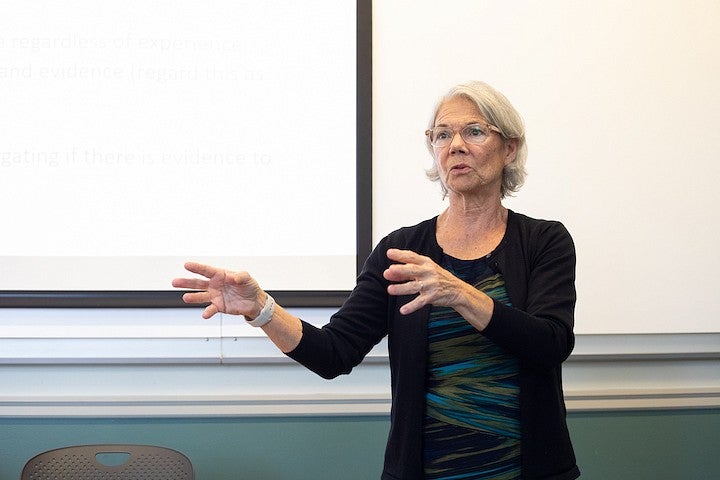
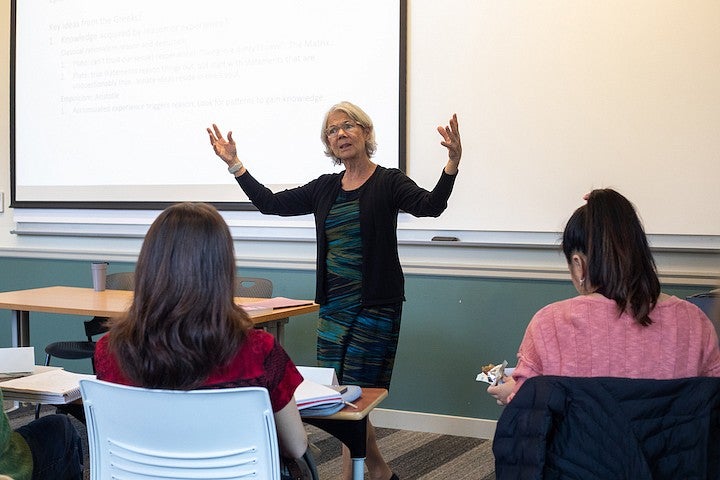
Educated and trained as an economist, Fitzpatrick was a legislative assistant, traveled the world, and started a family. She wants her students to be humble.
Fitzpatrick blazed through her high school classes early and decided she was ready for the next chapter of her life. She started college when she was sixteen. Looking back, she realizes how young she was. “But there was this sense of urgency,” she says. “I didn’t want to end up as somebody’s secretary. It was a different world then, and I felt like there was this race, and I was in it.”
She began at Georgetown University while working as a legislative assistant on Capitol Hill during the Watergate hearings. “I was so young and got very disillusioned with the way people interacted,” she remembers.
Every day, she watched the lengths to which people would go to gain personal power. She knew this much: She wanted to get far away from the sophistication of Washington, D.C.
Her next stop was at the University of Wyoming where she studied agricultural economics. Looking for some challenging higher-level classes, Fitzpatrick was stunned when her academic advisor told her: “Oh, dear, don’t worry about those upper-division classes. You’ll be married before you’d have to take those.”
She walked out of his office and out of Wyoming.
Fitzpatrick finished her last two years of college at the University of California-Santa Cruz, studying economic development. She learned about tropical agriculture and studied alongside brilliant economists. Her time at Santa Cruz helped her connect all the experiences that brought her this far, and it helped her prepared her for the next phase of her journey.
When a good solution isn’t the right one
After working in Indonesia as a research assistant examining the effects of the Green Revolution, Fitzpatrick spent three years in Papua New Guinea. Her role was to work with communities and design sustainable gardening systems. In Papua New Guinea, Fitzpatrick learned about slash-and-burn agriculture and the properties of the land’s soil.
She also learned a lot about a transformative tool called listening.
Because of an increase in population, the community wasn’t able to produce enough food for itself. Mountains were eroding, which contaminated rivers and blocked pathways in. “It was the beginning of an ecological disaster,” she remembers thinking at the time.
Fitzpatrick designed a new gardening system that was both technically and aesthetically beautiful. There would be contour mounds across hillsides that decreased erosion and enriched the soil. They would plant fruit trees and sweet potatoes—the community’s staple—and lots of vegetables. Legumes would nitrify the soil.
The women of the village told her the plans were great. But they didn’t follow them. After weeks of conversations, the women told Fitzpatrick: “We don’t have time for your garden.”
“If I could talk to my 25-year-old self, I’d say humility is probably one of the most important things that you can practice, because it lets you hear other people’s stories and concerns. It opens a space for their expertise. That doesn’t happen when you believe you’re the expert.”
The gardens Fitzpatrick designed were extremely labor intensive. The women couldn’t devote their whole days to tending to the crops. They also had to haul water, chop firewood, take care of their animals, and keep their families going.
Together, Fitzpatrick and the women designed a new system that wasn’t as productive, but it worked for the community. And that’s what mattered most.
“If I could talk to my 25-year-old self, I’d say humility is probably one of the most important things that you can practice,” she says now. “Because it lets you hear other people’s stories and concerns. It opens a space for their expertise. That doesn’t happen when you believe you’re the expert.
“People are really good problem solvers. Most of the world was solving their problems well before we, as the great white hope, thought we could solve their problems for them. So it’s just unleashing that, listening, and adding some insights, and a little bit of science, and a little bit of facilitation.”
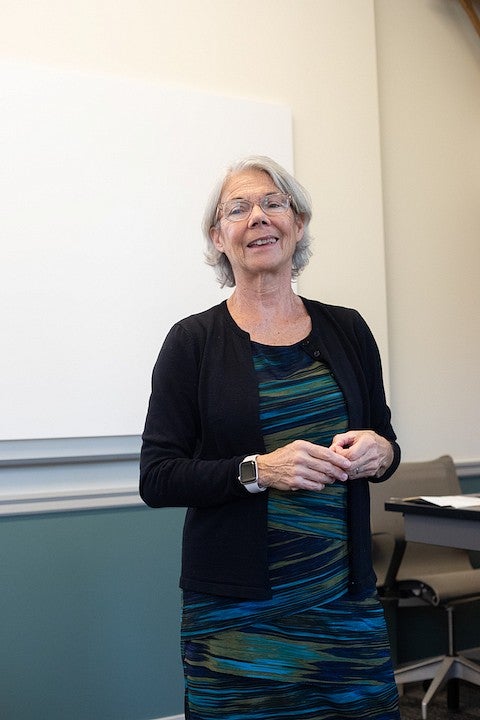
Empowerment through listening
After her time in Papua New Guinea, Fitzpatrick returned to the U.S. to finish her master’s at the University of California-Davis. She studied quantitative analysis because she thought, “nobody’s gonna want to hire somebody criticizing a system without having ways of measuring it.”
She became a self-described “quant jock,” always looking at numbers with the underlying question of how to apply them to real world situations. Empathy and an understanding of history were also required.
She returned to Washington after getting her master’s and worked for the United States Department of Agriculture. “After about five or six years in Washington,” she says, “I just had this hunger I had to go on.”
Fitzpatrick and her husband gave up their jobs, and with their two daughters in tow, moved to Michigan. She started on her PhD in agricultural and natural resource economics at Michigan State University.
When she started her doctoral program, one of her daughters was three, and the other was one. Five years later, as she was writing her dissertation, she also had a son. Fitzpatrick was the only woman in her program that was married and had children. She credits her completion of her PhD in part to stubbornness and persistence.
Fitzpatrick’s work has spanned Southeast Asia, the South Pacific, Latin America, Turkey, and parts of Africa. She had the same goal for every place she visited: to empower the communities there.
In Côte d’Ivoire, she worked with a community struggling with a fungus attacking their cocoa plants, the crop responsible for most of the nation’s income. But as Fitzpatrick visited villages and listened to the stories women were telling about their children, she discovered another problem.
The women kept telling her, “Our children get sick when it rains.” At first, these seemed like disjointed problems, but as Fitzpatrick kept listening she discovered the root of the issue. While playing in puddles after it rained, the children were exposed to parasites, which then drained them of their nutrients.
Because someone was listening to them, the women could engage in telling their stories. And because of these stories, Fitzpatrick was able to help them find solutions: flip flops for the children when it rained and routinely cleaning the streets.
From these few simple adjustments, the children started absorbing food again.
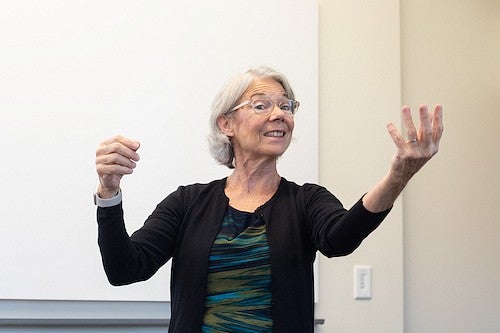
As an instructor, Fitzpatrick hopes to empower her students to see themselves as capable of being drivers of change. Before arriving at the CHC, she taught for the State University of New York, the University of Arkansas, and Merrimack College.
This fall, she’s teaching a Honors College class on solving the global problems of the 21st century, as well as an upper-level class on research methods for environmental issues.
“It’s so easy to get wrapped up in our own career ambitions. But, you know, at the end of the day, what have you achieved? Do you have a nice couch? Or have you made a difference, even a small difference?
“There are a lot of ways you can use your talents, your energy, and your privilege to help solve these problems,” Fitzpatrick says. “I hope as a faculty member, I can help make those connections to see where you can contribute to the common good.”
